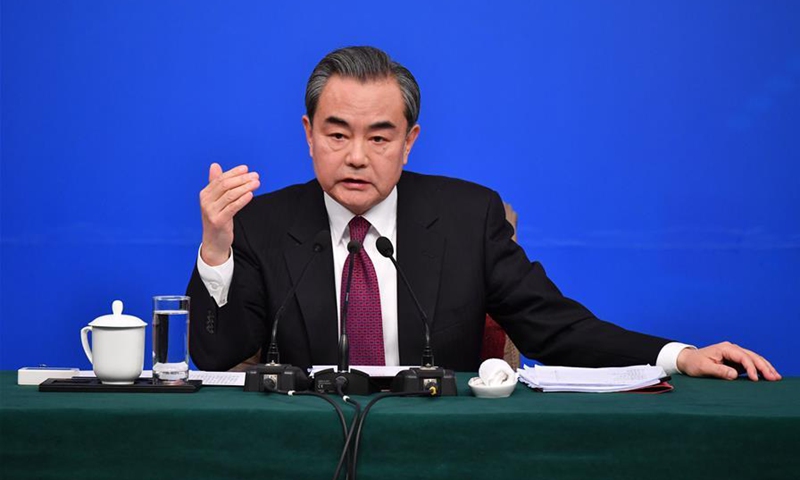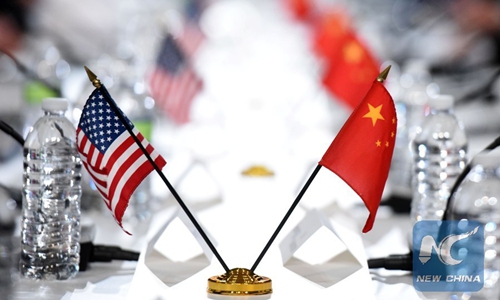China hopes for 'reasonable' US
By Yang Sheng Source: Global Times Published: 2020/7/9 21:43:40
Bilateral ties face most severe challenge since 1979: FM

Chinese Foreign Minister Wang Yi Photo: Xinhua
China continues to try its best to convince the US to stop dangerous approaches to deal with the ties, and to be sincere at dialogues to solve problems, said Chinese foreign minister in a speech at an online forum with more than 30 top diplomats and experts around the world on the direction of China-US relations.
China-US relations, "one of the most consequential bilateral relationships in the world," are faced with "the most severe challenge since the establishment of diplomatic ties," Chinese State Councilor and Foreign Minister Wang Yi warned on Thursday at the China-US Think Tanks Media Online Forum. Former US Secretary of State Henry Kissinger also attended the forum.
From the trade war and competition in the field of high-tech, such as 5G, to military tensions in the South China Sea and the Taiwan problem, as well as the war of words on the COVID-19 pandemic, the two most powerful countries and biggest economies in the world have been competing and struggling in almost every aspect in recent years.
Although China is receiving pressure and challenges from the US, the Chinese government has always being calm and pragmatic in handling the severe situation, while the US is getting increasingly unpredictable and unreasonable, experts said.
However, experts are pessimistic about whether the US would appreciate China's sincerity and return to the right track, as Washington refuses to accept the rise of China even if it's aware of the fact. In the future, more struggles will come.
Analysts said maybe the struggles, which could make hostile forces in the US feel the pain, could help the US learn how to coexist with China peacefully. The unprecedented global challenge of COVID-19 pandemic, for example, could force US decision-makers to choose cooperation if the US realizes it cannot save its economy, as well as the world economy, on its own.

File photo taken on November 23, 2016 shows the national flags of the United States and China during the 27th Session of the China-US Joint Commission on Commerce and Trade in Washington DC, US. Photo: Yin Bogu/Xinhua
Sincerity and suggestions
Wang stressed that China and the US should not seek to remodel each other. Instead, they must work together to find ways to peacefully coexist the different systems and civilizations.
"China's US policy remains unchanged. We are still willing to grow China-US relations with goodwill and sincerity," Wang said.
"Some friends in the US might have become suspicious or even wary of a growing China. I'd like to stress here again that China never intends to challenge or replace the US, or have a full confrontation with the US. What we care most about is to improve the livelihood of our people," he noted.
Jin Canrong, the associate dean of Renmin University of China's School of International Studies in Beijing, told the Global Times on Thursday that the foreign minister is offering goodwill, but the problem is "the US wants to remodel us even though we don't want to remodel the US. Washington doesn't believe stopping the confrontation is urgent, and that a crackdown on China is more important for it to maintain its global hegemony."
The Chinese government told the US and the world many times that China has no intention of replacing or challenging the US. Unfortunately, US elites only care about China's capability and disregards China's intentions, said Lü Xiang, a research fellow at the Chinese Academy of Social Sciences in Beijing.
Wang also gave suggestions - "three lists" - for the two sides to settle confrontations and pull the ties back from the brink.
The first is a list of cooperation areas. It should specify all areas, bilateral and global, where China and the US need to and can work together, Wang said. "The longer the list, the better. Cooperation on this list should be immune to the impact of other issues."
The second is a list of dialogues. "It should itemize the differences that could be solved through dialogue," Wang said, adding they should adapt to the existing dialogue mechanisms and platforms as soon as possible.
The third is a list of issues that need proper management. "It should identify the few tough issues that the two countries have little chance to agree on in the near future," Wang said.
Diao Daming, a US studies expert at Renmin University in Beijing, said offering such sincere suggestions while some US senior officials are poisoning China-US ties is not easy and commendable, and it shows China is aware of its responsibility as a major power to fix the most important bilateral relationship in the world.
Struggles needed
However, Washington knows the rise of China is a fact but refuses to accept it. Jin said, "This is why the US is unlikely to give a positive response, and maybe we can help the US accept the facts by having more "effective struggles," which could let them feel the pain, and keep on with our own development. Maybe in five more years, when China totally surpasses the US to become the biggest economy of the world, the US will accept and adjust its approaches."
Lü said now is the chance for US policymakers to think rationally about their country's severe economic situation, as this might help us pull China-US ties back from the brink.
"According to surveys from some US institutes, China is not a hot topic among the US voters, with the racial problem, economy and COVID-19 more important. So, the White House might realize that blaming and confronting China will not be helpful for the election," he noted.
Boosting the economy is the only card that the Trump administration can still play to save its approval rating, and China's cooperation, especially implementing the phase one trade deal, is essential, Lü added.
Wang said that "despite the impact of COVID-19, 74 percent of US businesses in China said they plan to make more investments here. Recently, 191 agricultural organizations sent a joint letter to US President Donald Trump calling for the continued implementation of the phase one trade agreement. Many US universities have openly expressed their support for closer China-US educational exchanges."
"Many global leaders have called on China and the US to increase dialogue and cooperation and avoid confrontation and decoupling. These are the advice we must heed. More important, they are also the goals we must work for," he said.
The Chinese foreign minister also pointed out the correct direction for the two countries to jointly fight the pandemic. Observers believe that without China-US cooperation, it would be extremely difficult for the world to completely win the fight against the virus and realize global economic recovery.
"China is ready to share with the US information about COVID-19 prevention and containment as well as our response experience. And we are also ready to have closer exchanges with the US on diagnostics and therapeutics, vaccines, and economic recovery," Wang said.
"The US, for its part, should immediately stop its acts of politicization and stigmatization. It should work with China to promote a global response to save more lives, and live up to our international responsibility as two major countries," he noted.